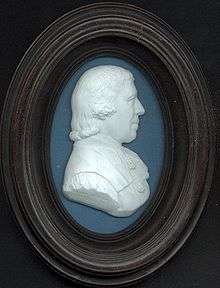Henry Hunter (divine)
Henry Hunter (25 August 1741 – 27 October 1802) was a Scottish minister who translated the works of noted scholars including Leonard Euler and Johann Kaspar Lavater.[2]


Biography
Henry Hunter was born at Culross in Perthshire, on 25 August 1741. He was the fifth child of David and Agnes Hunter. In 1754 he was sent to the University of Edinburgh at the age of 12. He became tutor to Alexander Boswell (later a judge and Lord Balmuto).[2]
Hunter became the Earl of Dundonald's family tutor at Culross Abbey. In 1764 he received licence to preach from the presbytery of Dunfermline and he became the minister of the important South Leith Parish Church near Edinburgh in 1766.
In 1769 he preached in London and although invited to lead a Scottish congregation in Piccadilly he finally accepted an invitation from the London Wall church in 1771. Hunter was chaplain to the Scots Corporation in London, and in August 1790 he was elected correspondence secretary to the Society for Propagating Christian Knowledge in the Highlands and Islands of Scotland.[2]
In 1797, the Rev. John Fell[3] had been tasked with delivering twelve lectures of the evidence for Christianity. When Fell died after delivering only four of the lectures, the job was given to Hunter who completed the task and published the result as a book.[4]
Scholar
In 1771, Hunter was made a Doctor of Divinity by the Edinburgh University. Hunter visited Johann Kaspar Lavater in Zurich in August 1787 and secure Lavater's agreement to the publication of an English version of his Essays on Physiognomy.[2] Lavater was initially cool to the idea, but was persuaded by Hunter's skill in his language. The book was well received in England and Hunter was then tempted to try a translation from German of a work on electricity by Leonard Euler.[5]
Family
In May 1766 he married Margaret Charters, the daughter of the minister of Inverkeithing. They had only two sons and a daughter who survived them, as Hunter's final years saw the deaths of four of his children.
He died at Bristol on 27 October 1802 and he was buried in the non-conformist cemetery of Bunhill Fields in London.[2] The grave lies just to the side of the main path and is of distinctive form.
Works
- Hunter's Sacred Biography, A Course of Lectures on the Principal Characters Mentioned in the Old Testament; and On the Principal Events in the Life of Christ. First Publication 1794 in multiple volumes. There have been numerous editions and edits to the current day.
- Sermons 1795, 2 vols.
- Sermons and other Miscellaneous Pieces, 1804
Translations include
- 'Lavater's Essays on Physiognomy,' 1789–98, illustrated with more than eight hundred engravings managed by Thomas Holloway. (The original cost price of each copy was 30 pounds.)
- Euler's "Letters to a German Princess on different subjects in Physics and Philosophy," 1795, with notes by Sir David Brewster.[6]
- Bernardin de St. Pierre's Studies of Nature and Botanical Harmony, 1796-7.
- Sonnini de Manoncourt's Travels to Upper and Lower Egypt, 1799
- Rev. James Saurin's Sermons, 1800-6, 7 vols. 8vo.
- J.H.Castéra's History of Catharine II, 1800.
References
- Henry Hunter (1804). Sermons, and other miscellaneous pieces. Printed for J. Murray.
- Goodwin, Gordon (1891). . In Lee, Sidney (ed.). Dictionary of National Biography. 28. London: Smith, Elder & Co.
- Alexander Gordon, 'Fell, John (1735–1797)’, rev. M. J. Mercer, Oxford Dictionary of National Biography, Oxford University Press, 2004 accessed 14 May 2010
- Robert Kerr (1811). Memoirs of the life, writings and correspondence of W. Smellie. p. 71.
- Robert Chambers (1841). Lives of illustrious and distinguished Scotsman, forming a complete Scottish biographic dictionary: Embellished with splendid and authentic Portraits. Verstehendes Exemplar kam im Juli 1859 an der Stelle das früher hier Stehender u ab. d. Titel: "A biographical dictionary of eminent Scotsman. 4 Voll. Gl. 1839. Blackie and son. pp. 145–.
- Euler, Leonard; Hunter, Henry (1795). Letters to a German Princess on different subjects in Physics and Philosophy (1795 translation ed.). London: Printed for the translator and for H. Murray.
- Attribution
![]()